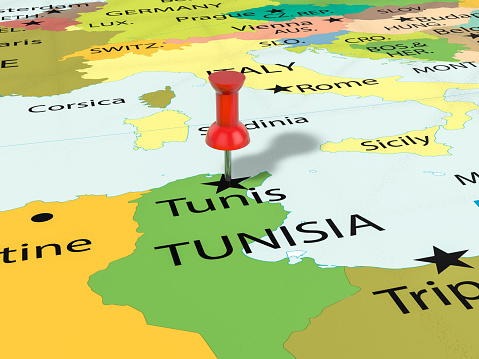A Tunisian court handed down jail sentences of up to 66 years to multiple defendants, including prominent opposition figures, for national security offences, local media and a defence lawyer said Saturday.
The trial, criticised by rights groups and decried by a defence lawyer as a “masquerade”, is of unprecedented scale with around 40 defendants including vocal critics of President Kais Saied.
They were found guilty of “conspiracy against state security” and “belonging to a terrorist group”, and received sentences raging from 13 to 66 years, an official from the anti-terrorism prosecutor’s office told media outlets including Jahwara FM.
Among those sentenced were well-known opposition figures, lawyers and business people, with some already in prison for two years while others were in exile or still free.
Issam Chebbi and Jawhar Ben Mbarek of the opposition National Salvation Front coalition, as well as lawyer Ridha Belhaj and activist Chaima Issa were sentenced to 18 years behind bars, defence lawyer Abdessatar Messaoudi told AFP.
Activists Khayam Turki was handed a 48-year term while businessman Kamel Eltaief received the harshest penalty of 66 years in prison, added the lawyer.
Kamel Jendoubi, a rights advocate and former minister tried in absentia, slammed what he called a “judicial assassination” by the courts.
“This is not a judiciary ruling, but a political decree executed by judges under orders, by complicit prosecutors and by a justice minister” who all serve “a paranoid autocrat”, charged Jendoubi.
Since Saied launched a power grab in the summer of 2021, during which he assumed total control, rights advocates and opposition figures have decried a rollback of freedoms in the North African country where the 2011 Arab Spring began.
On Friday evening, defence lawyers denounced the trial after the judge finished reading the accusations and began deliberation without hearing from either the prosecution or the defence.
Samia Abbou, one of the lawyers, told AFP that there were “flagrant violations of judicial procedure” with the accused “not heard”, denouncing it as a “masquerade”.
The hearing lasted much of the day, with media barred from the proceedings, along with foreign diplomats who had previously been admitted.
Since proceedings began on March 4, lawyers for the defence have repeatedly called for all the defendants to appear in court, including at least six who have been on hunger strike.
The lawyers denounced the case as “empty”, while Human Rights Watch said the trial was taking place in the context of repression with President Saied “weaponising the judicial system to target opponents and dissidents”.
Analyst Hatem Natfi said in a post on X that any acquittal in the mass trial “would have negated the conspiratorial narrative that the regime has relied on since 2021” and “accepted by a large part of the population” relying on restricted media coverage.

